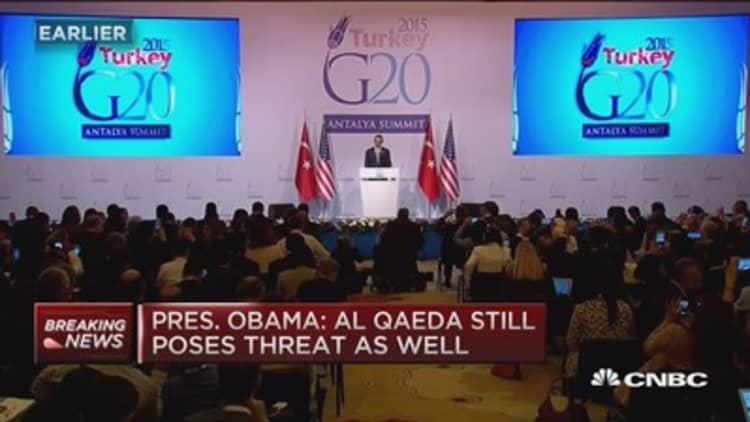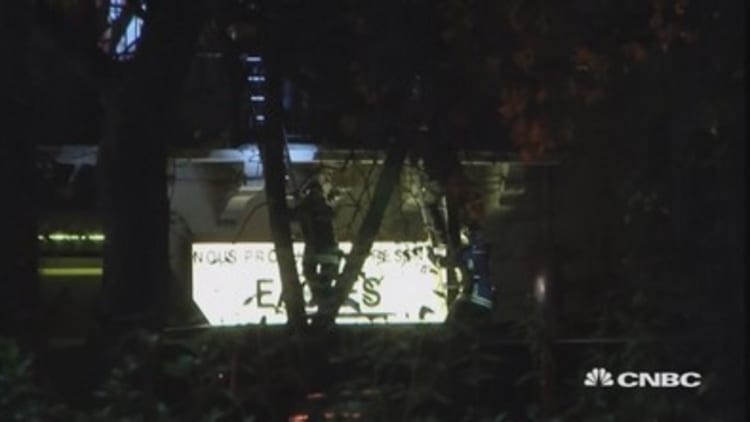The deadly terror attacks in Paris and Beirut have stirred up political tensions in an unlikely locale: Silicon Valley.
Terrorists may have take advantage of encrypted messaging services to avoid surveillance, reports said, raising the stakes on an already tenuous issue between lawmakers and technologists. Technology companies largely oppose creating government "back doors" in their end-to-end encryption, while regulators and law enforcement have pushed for power to monitor communications systems for potential threats to national security.
Just like 9/11 and whistleblower Edward Snowden shifted the debate over balancing individual liberty versus national security, experts are now wondering if Friday's attacks will alter the balance again, forcing tech companies to re-examine the widespread attachment to end-to-end message encryption.
"Our sensibilities and souls should have been jarred once again," CIA Director John Brennan said of the attacks Monday, according to The Wall Street Journal. Brennan joined other policymakers in condemning new limits in the U.S. and other countries on intelligence gathering amid privacy and civil liberties concerns.
Terrorists could be using Sony's Playstation 4 to send messages, for example, because decryption is very difficult, according to Jan Jambon, Belgium's minister of the interior, who spoke at a Politico conference three days before the attacks in Paris. Last week, Britain unveiled a draft surveillance bill that would place explicit obligations on service providers to help intercept data and hack suspects' devices.
Sony responded: "PlayStation 4 allows for communication amongst friends and fellow gamers, in common with all modern connected devices. We take our responsibilities to protect our users extremely seriously, and we urge our users and partners to report activities that may be offensive, suspicious or illegal. When we identify or are notified of such conduct, we are committed to taking appropriate actions in conjunction with the appropriate authorities."
Apple CEO Tim Cook said he opposed that kind of monitoring, saying that Apple would need to create a back door in the encryption of iMessages to comply and that this would expose data to hackers, Reuters reported.
"If you leave a back door in the software, there is no such thing as a back door for good guys only," Cook said to students in Dublin last week, according to Reuters. "If there is a back door, anyone can come in the back door. ... We believe that the safest approach for the world is to encrypt end-to-end with no back door. We think that protects the most people." Apple did not respond to a request for comment.
Outspoken journalist and internet freedom activist Glenn Greenwald also pushed back at regulators, arguing in a blog post that blaming technology companies is a tactic to shift the blame away from government shortcomings. Hacking group Anonymous, meanwhile, launched a vigilante campaign to try and thwart the online presence of ISIS, according to an unverified YouTube video.
But experts told CNBC that the "fight for cyberspace" — including more government surveillance — will be critical.


Read More"It's great to counterattack [ISIS stronghold] Raqqa, and take more ground ... but where's the fight in cyberspace? Who's in charge of it, and who is putting milestones out to defeat it?" Mark Kimmitt, former assistant secretary of state, told CNBC Monday. "It could well be that part of this is an intelligence gap, part of this is this ongoing debate between security and privacy."
While celebrated by some, the regulatory pullback that occurred after Snowden's leaks may have hampered the ability to share intelligence in the international community, Robert Liscouski, former assistant secretary of homeland security, told CNBC.
"You might call them invasive," Liscouski said. "But nonetheless, we need to have more ubiquitous surveillance capabilities to detect these types of attacks."
— CNBC's Luke Graham, Holly Ellyatt and Reuters contributed to this report.




